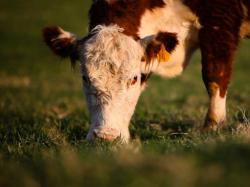Study Finds No Clear Safety Advantage For Grass-Fed Beef
July 21, 2010 | 1 min to read

A recent study of a modest sample of US retail beef products found little difference between the levels of bacteria in grass-fed and conventionally raised beef, despite marketing claims that grass-fed beef is safer.
Reporting in Foodborne Pathogens and Disease, researchers said they found no significant differences in total coliform bacteria, Escherichia coli, or Enterococcus species. They also looked at antimicrobial resistance and found mixed evidence, with some signs of increased resistance in bacteria isolated from conventional beef as compared with grass-fed beef.
"Taken together, these data indicate that there are no clear food safety advantages to grass-fed beef products over conventional beef products," says the report by investigators from Purdue University in Indiana and Zhejiang University in Hangzhou, China.
They write that grass-fed beef products are often marketed as safer than conventional grain-finished beef because of the potential effects of the grass diet on gut microbes. But they suggest that other factors, including where and how beef is processed and whether cattle are fed preventive antimicrobials, may have larger effects on contamination in finished products. Grass-fed cattle are more likely to be processed in small facilities and are less likely to be given preventive antibiotics, the authors say.
To read the rest of this story please go to: CIDRAP
